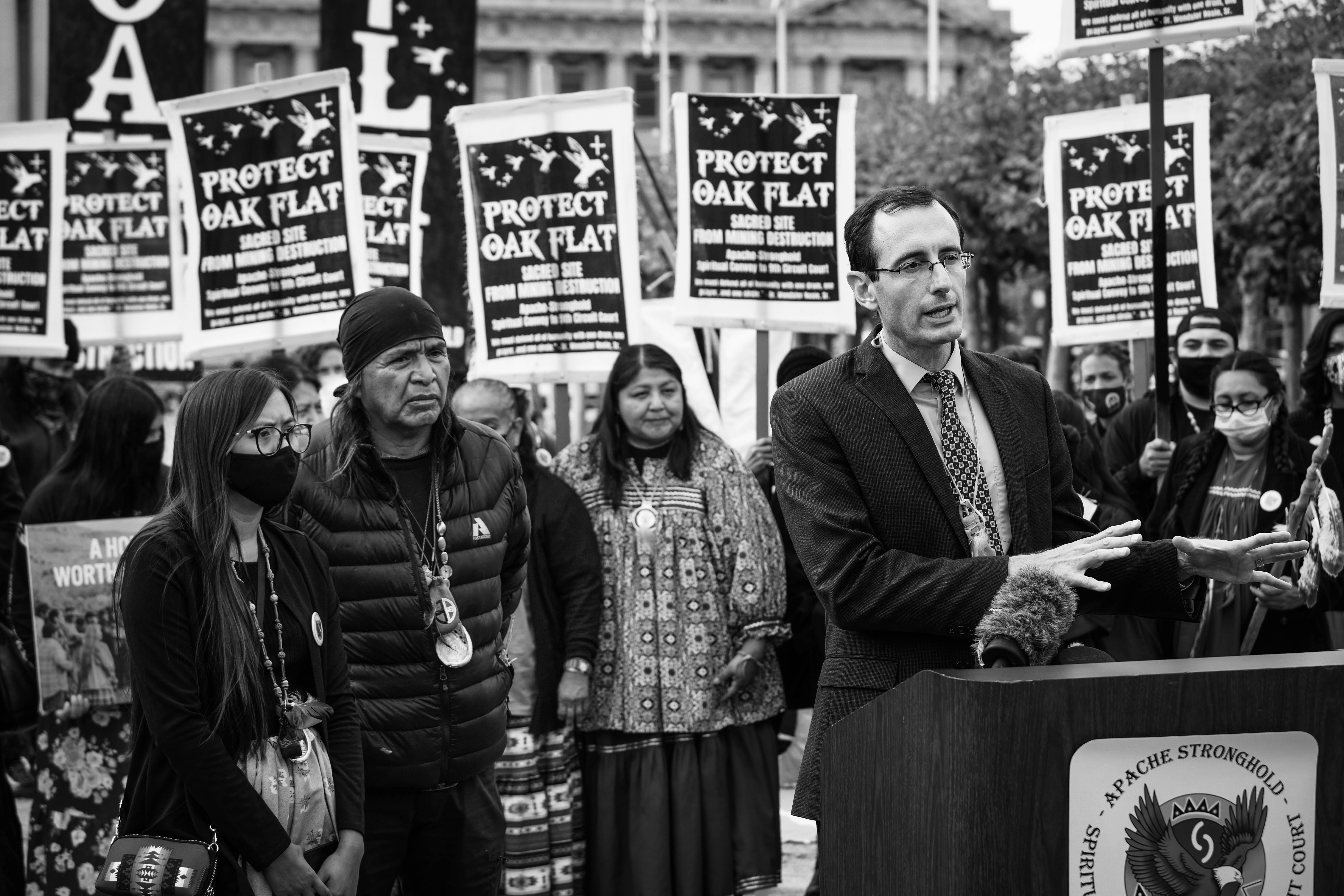
- Details
- By Darren Thompson
WASHINGTON— Tribal and congressional leaders joined the San Carlos Apache Tribe on Wednesday, April 26, in a prayer ceremony and press conference denouncing Arizona’s Resolution Copper Mine project.
The event, dubbed “Prayer to Save Oak Flat,” was hosted across the street from the White House in Lafayette Square Park.
“The Biden Administration is poised to give sacred Apache land in eastern Arizona to foreign mining companies with close financial ties to the Chinese government to construct an unnecessary copper mine that will destroy Oak Flat,” said San Carlos Apache Tribe Chairman Terry Rambler in a statement. “Destroying Oak Flat would be a major human rights violation. Tribes across the country vehemently oppose this assault on tribal sovereignty and Native American religious freedom.”
Resolution Copper hopes to build a copper mine near a place the Apache and other tribes consider sacred, a ceremonial ground called Chí’chil Biłdagoteel, or “Oak Flat,” in Arizona’s Tonto National Forest. Because the mine is on federal lands, the permitting process is overseen by the U.S. Forest Service. Federal legislation was passed in 2014 that paved the way for a land swap between Resolution Copper and the U.S Forest Service, where Resolution Copper would exchange 5,429 acres of Arizona land it owns in exchange for 2,422 acres of federal land above a massive copper deposit.
The value of the mine is estimated at $64 billion, with 1.787 billion metric tonnes of copper with an average grade of 1.5% copper over the next 60 years. The company says the mine’s life will provide thousands of direct and indirect jobs and will supply nearly 25% of the domestic demand for copper.
In the final days of the Trump Administration, the U.S. Forest Service published the project's final environmental impact statement (FEIS) on January 15, 2021. However, president Biden halted the FEIS on March 1, 2021, saying the project needed more time to consult with Indian Tribes.
“We want the EIS redone because the EIS the Trump Administration rushed to publish didn’t have all the negative impacts the Tribe and other organizations came up with,” San Carlos Apache Chairman Terry Rambler told Native News Online. “It wasn’t fair the way they did.”
Rambler said the tribe and allies drafted a memorandum of understanding they wanted to enter with the USDA to ensure a fair consultation process.
Because the MOU wasn’t signed, Rambler disagrees that consultation was officially done. As a result, The Apache Stronghold — a nonprofit advocacy group led by Rambler — filed a lawsuit on January 21, 2021, against the project.
In the lawsuit, the Apache Stronghold states, “the Apaches view Oak Flat as a ‘direct corridor’ to the Creator’s spirit.” They also argued that the land exchange violates their First Amendment rights and the Religious Freedom Restoration Act, where “government should not substantially burden religious exercise without compelling justification.”
The 9th Circuit Court decided in early 2022 that Resolution Copper could proceed with operations while the lawsuit is pending in court. Last November, the court announced that it would rehear Apache Stronghold v. United States “en banc” in front of a full panel of 11 judges. The court requested the en banc hearing to rehear the case, and is extremely rare, Apache Stronghold’s legal counsel Becket Law told Native News Online last fall. A call to rehear a case happens in less than 0.5 percent of cases the court hears.
Oak Flat is listed on the National Historic Register of Historic Places as a Traditional Cultural Property. It has been protected from mining by Congress for more than 60 years. Last week, leaders at the United Nations Permanent Forum on Indigenous Issues (UNPFII) acknowledged and called the Resolution Copper project a human rights violation and said the project will destroy an entire way of life for the Apache people.
U.S. Rep. Raul Grijalva, D-Ariz., joined Apache leaders with other congressional representatives and Tribal leaders from Oklahoma and North Carolina, and the president of the Inter Tribal Association of Arizona.
Together, they hope President Biden will stop the mine from proceeding.
More Stories Like This
Trump signs law that revokes some limits on drilling in Alaska’s National Petroleum ReserveSouthern Sierra Miwuk Nation Gets 900-Acres ofLand Back
Chilkat Indian Village Tells New Palmer Mine Owners They Are “Not Welcome” in Chilkat Valley
Tribes, Coastal Group Ask Army Corps to Revoke Permit for Texas Export Terminal
Michigan Tribes Tell Supreme Court: Don’t Bail Out Enbridge
Help us defend tribal sovereignty.
At Native News Online, our mission is rooted in telling the stories that strengthen sovereignty and uplift Indigenous voices — not just at year’s end, but every single day.
Because of your generosity last year, we were able to keep our reporters on the ground in tribal communities, at national gatherings and in the halls of Congress — covering the issues that matter most to Indian Country: sovereignty, culture, education, health and economic opportunity.
That support sustained us through a tough year in 2025. Now, as we look to the year ahead, we need your help right now to ensure warrior journalism remains strong — reporting that defends tribal sovereignty, amplifies Native truth, and holds power accountable.
 The stakes couldn't be higher. Your support keeps Native voices heard, Native stories told and Native sovereignty defended.
The stakes couldn't be higher. Your support keeps Native voices heard, Native stories told and Native sovereignty defended.
Stand with Warrior Journalism today.
Levi Rickert (Potawatomi), Editor & Publisher

